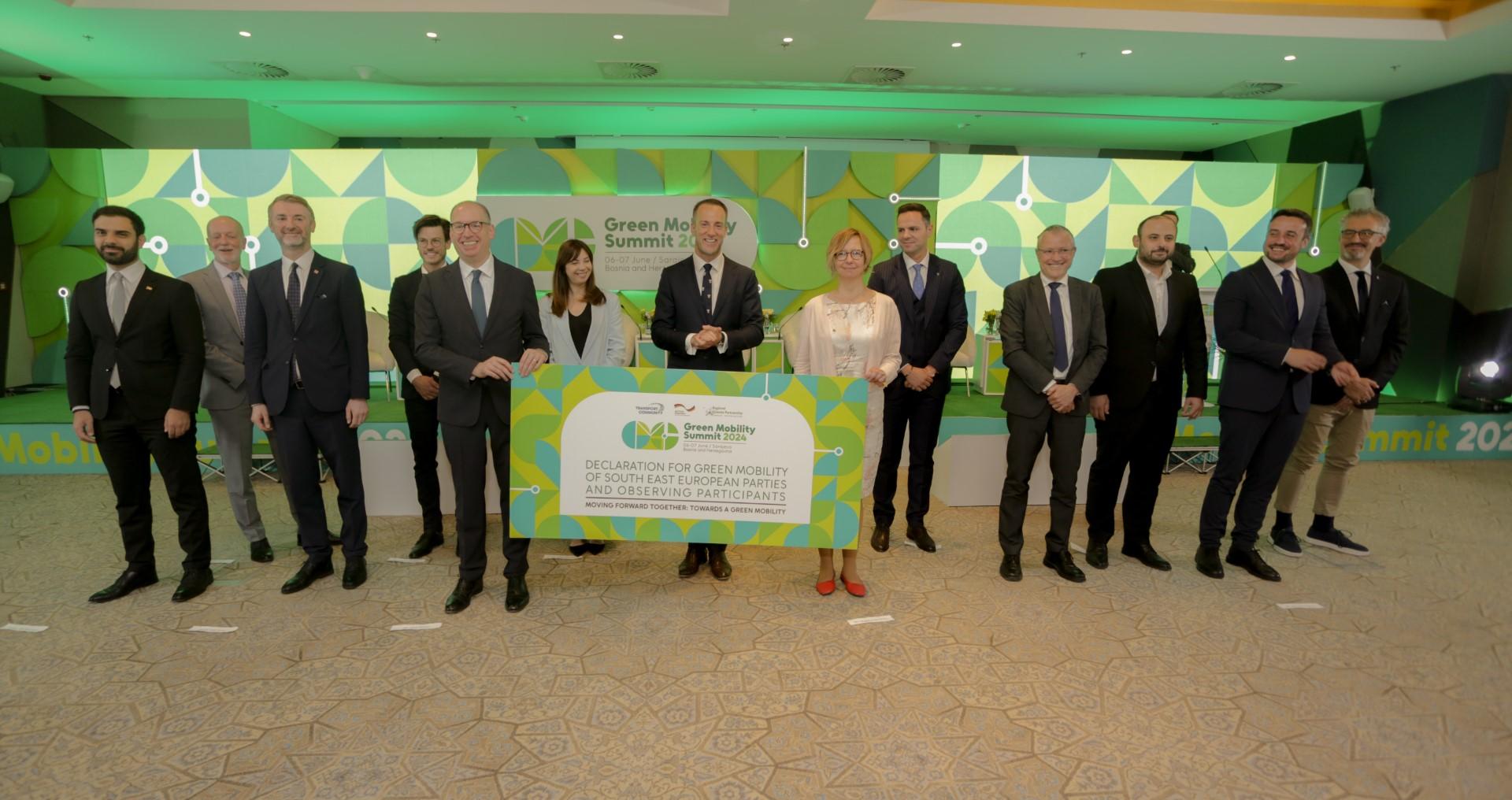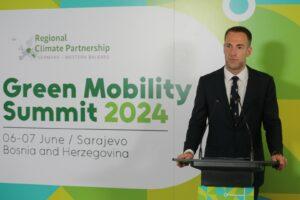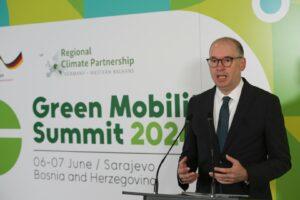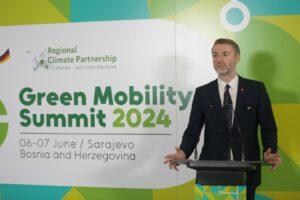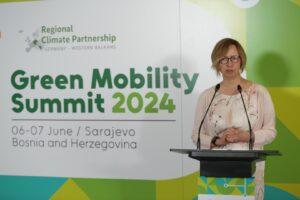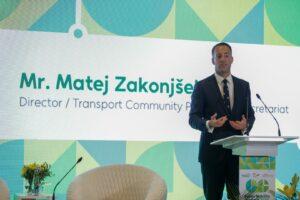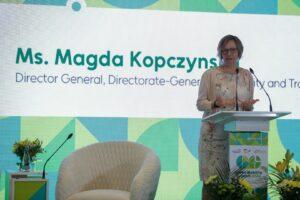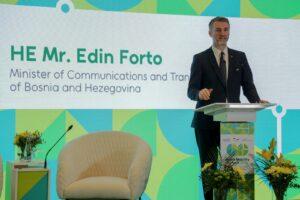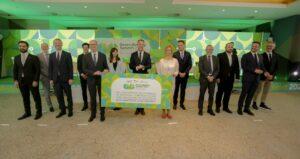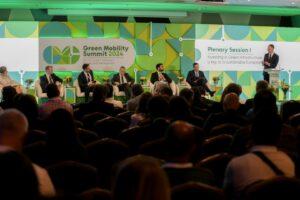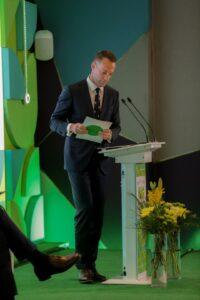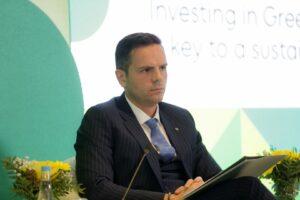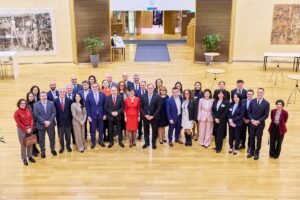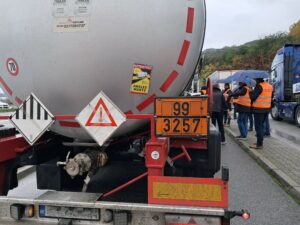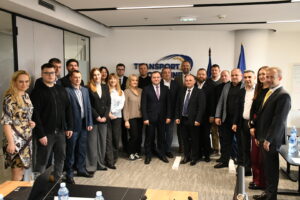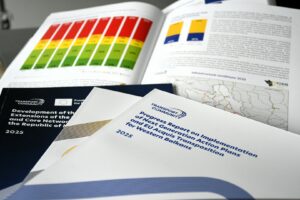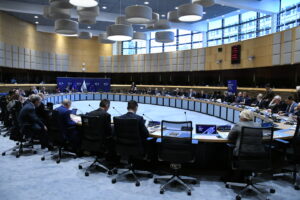SARAJEVO – The Green Mobility Summit, held on 6-7 June 2024 in Sarajevo, Bosnia and Herzegovina, brought together experts and leaders to discuss and promote innovative sustainable transport solutions. The event fostered discussions and knowledge exchange on greening the transportation sector, aiming to make it more sustainable. The summit culminated with the endorsement of the Declaration for Green Mobility of South East European Parties and Observing Participants.
Organised by the Transport Community Permanent Secretariat and the German Federal Ministry for Economic Cooperation and Development (BMZ), through the Regional Climate Partnership between Germany and the Western Balkans, the Summit explored the ways to improve transport infrastructure and climate resilience in the Western Balkans, Georgia, Moldova, and Ukraine. During the event, participants endorsed the overarching Green Mobility Declaration, pledging to promote zero-emission and smart mobility, enhance climate resilience in transport networks, and foster regional cooperation for sustainable transport solutions.
Mr Matej Zakonjšek, Director of the Transport Community Permanent Secretariat, pointed out that the Summit showcased the latest developments and trends in the green mobility transition in the Western Balkans and beyond. “The good news is that we see good examples and things moving forward across the region. We are happy to assist the authorities in continuing this important work,” he pointed out.
Parliamentary State Secretary of the German Federal Ministry for Economic Cooperation and Development Mr. Niels Annen said the Summit is important for every citizen in the region but also in the EU. Without the Western Balkans, the EU will not be able to reach the goal of becoming the first carbon-neutral continent by 2050. He stated that the transport sector is the main cause of CO2 emissions, hence, air pollution, health issues and other negative consequences are directly linked. “I am pleased to say that 25 regional cities and municipalities are participating in the sustainable mobility efforts we support in the Western Balkans. Ahead of the European Parliament elections, I want to emphasise how important cooperation with the EU members is and how committed we are to helping our partners fulfil their obligations required to join the EU, fostering regional integration,” he concluded.
H.E. Mr. Edin Forto, Minister of Communications and Transport of Bosnia and Herzegovina, noted that Bosnia and Herzegovina has much to show in terms of its green transformation. “In the capital city, we can see one of the key elements of green mobility, which is public transport undergoing a complete revolution. Today, on the last day of the conference, we plan to sign a Declaration, through which we will move forward together and stronger, not only towards the EU but also to improve the quality of life in the region,” the Minister said.
Ms. Magda Kopczynska, Director General of the Directorate-General for Mobility and Transport in the European Commission remarked that the Transport Community Partners took a significant step today by pledging to implement concrete measures to advance green, smart, and resilient mobility, including commitments on sustainable urban mobility, cycling, and clean buses. “This reaffirms how we can make meaningful progress together in this area,” she underlined.
On 7 June, the second day of the Summit, ministers and mayors from the Western Balkans, Georgia, Moldova, and Ukraine convened to discuss key topics such as investing in green infrastructure and sustainable mobility as a key to a sustainable European future, moving toward zero-emission mobility through lessons learned, and bridging the gap between local and higher-level authorities to promote sustainable mobility.
The summit endorsed the Declaration for Green Mobility of South East European Parties and Observing Participants. By endorsing the Declaration, the authorities committed to integrating their transport markets into the EU’s, focusing on zero-emission mobility, transport digitalisation, and the TEN-T Network extension. The document emphasises sustainable mobility through alternative fuel infrastructure, e-charging stations, and sustainable urban mobility plans, while also improving climate resilience in transport networks. The Clean Bus and Clean Fleet Platform, as part of the Declaration, aims to reduce air pollution by promoting clean energy and advanced technologies in public buses, supported by infrastructure development, partnerships, and funding. The declaration also promotes cycling as a sustainable transport mode, with commitments to develop national policies, improve safety, integrate cycling into urban planning, and enhance international cooperation.
During the Summit’s first day, gathered experts and local authorities showcased successful examples and best practices in green urban mobility. Discussions focused on the rapid advancement and implementation of sustainable urban mobility plans (SUMP), with city representatives sharing their experiences in adopting SUMP, the challenges faced, and the innovative solutions implemented. The implementation of the Sustainable and Smart Mobility Strategy for the Western Balkans was also discussed, focusing on digital solutions in mobility and the latest advancements and technological innovations reshaping the transport landscape.
By jointly organising the Summit, the Transport Community and the BMZ, through the Regional Climate Partnership between Germany and the Western Balkans, prioritised initiatives such as environmentally friendly transport investments, the deployment of alternative fuel infrastructure, infrastructure resilience, and innovations that will catalyse a transformation in the transport sector.
BACKGROUND
On Transport Community
The Transport Community is an international organisation in the field of mobility and transport. It has 36 participants – the European Union member states represented by the European Commission, the Western Balkans six, and the three observing participants (Georgia, Republic of Moldova and Ukraine). We are working on integrating Western Balkans’ transport markets into the EU by assisting the six Western Balkans partners in adopting and implementing the EU legislation in the transport field and supporting projects connecting Western Balkans regional partners among themselves and with the EU.
Regarding sustainable and smart mobility, our vision is to transform mobility in the Western Balkans by fostering the development of cleaner, safer, smarter, resilient, competitive, and sustainable transport system. Our goal is to connect people and businesses across the region and beyond, considering the environmental impact of transport, thus unlocking new opportunities for growth and progress.
On Regional Climate Partnership between Germany and the Western Balkans
The Green Mobility Summit is an integral part of the Regional Climate Partnership between Germany and the Western Balkans. This partnership was initiated through the Joint Declaration of Intent, which received endorsement in October 2023 from the Western Balkans leaders and Germany during the Berlin Process Summit in Tirana. Embedded within the existing regional integration, the summit emphasises the regional dimension and integration of ongoing and planned bilateral and regional projects, demonstrating a collective commitment to sustainable mobility and climate resilience.

